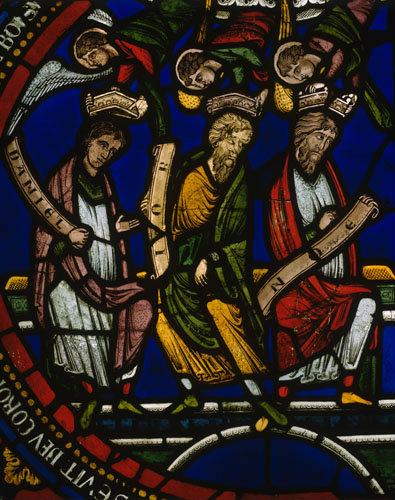 |
| Job, Daniel, Noah Three Righteous Men Poor Man's Bible 13th C Sonia Halliday Photo |
Title: The use of the name Daniel both for the title of book and its protagonist is probably the same reason the name Solomon was used in the Wisdom of Solomon and the Song of Solomon. That is to say that a certain Daniel (not even an Israelite?), along with Noah and Job, were "figures known widely in the ancient Near East" and were seen as exceedingly righteous men (Collins). These three are depicted in the stained glass window to the right. The name Daniel may refer to the Danel or Daniel mentioned in Ezekiel Chapter 14 or it may refer to a judge Danel/Daniel from an Ugarit 14th century BC legend.
So, first question, was there really a Jewish exile who interpreted Nebuchednezzar's dream and the handwriting on the wall? And did this exile have friends Hananiah, Mishael and Azariah, renamed in exile respectively as Shadrach, Meshach and Abednego? Did they endure some sort of torture, whether a fiery furnace or other, and emerge unscathed? Did Daniel survive a torture, a lion's den or other?
Regardless of the answers to these (perhaps naive) questions, Baker says that the book of Daniel was written for the purpose of inspiring Jews experiencing the domination if not persecution of a foreign power, the Seleucids. Daniel is an example of a wise (e.g. his Solomonic role in determining the fate of poor Susanna) and a godly man who shows undying faith in the one God of Israel. Daniel's God is more powerful than the pagan's idols and Daniel's faith gives him the wisdom to be clearly smarter than the Chaldean sorcerers and priests (e.g. Daniel can interpret the dreams where they are unable).
As noted earlier, Daniel is deemed the only book in the OT which is truly apocalyptic, though I fail to see why certain chapters of Ezekiel wouldn't qualify.
Chapter 12 of Daniel alludes to the resurrection of the body and both Baker and Eerdmans say, respectively, this is the only (?) such reference in the OT and the earliest reference. However, what about the Wisdom of Solomon, the first five chapters and also the writings in the Books of the Maccabees?
No comments:
Post a Comment